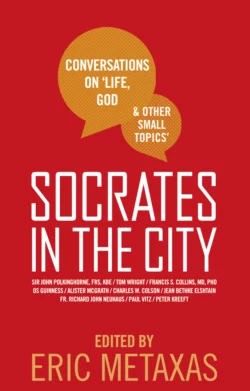Socrates in the City: Conversations on Life, God and Other Small Topics

Eric Metaxas
Тип: электронная книга
Жанр: Зарубежная религиозная литература
Язык: на английском языке
Стоимость: 342.98 ₽
Статус: В продаже
Издательство: HarperCollins
Дата публикации: 16.04.2024
Отзывы: Пока нет Добавить отзыв
О книге: Following the extraordinary success of the New York Times bestseller Bonhoeffer, Eric Metaxas′s latest book offers inspirational and intellectually rigorous thoughts on the big questions surrounding us all today.The Greek philosopher Socrates famously said that ‘the unexamined life is not worth living’. Taking this as a starting point, Eric Metaxas founded a speaking series that encouraged busy and successful professionals to attend forums and think actively about the bigger questions in life. Thus Socrates in the City: Conversations on ‘Life, God, and Other Small Topics’.This book is for the seeker in all of us, the collector of wisdom, and the person who asks ‘what’s the point?’. Within this collection of original essays that were first given to standing-room-only crowds in New York City are serious thinkers from all around the world taking on Life, God, Evil, Redemption, and other similarly small topics.Luminaries such as Dr. Francis Collins, Sir John Polkinghorne, Tom Wright, Os Guinness, Peter Kreeft and George Weigel have written about extraordinary topics vital to both secular and Christian thinking, such as ‘Making Sense Out of Suffering’, ‘The Concept of Evil after 9/11’, and ‘Can a Scientist Pray?’. No question is too big – in fact, the bigger and the more complex the better. These essays are both thought-provoking and entertaining, because nowhere is it written that finding answers to life′s biggest questions shouldn′t be great fun…